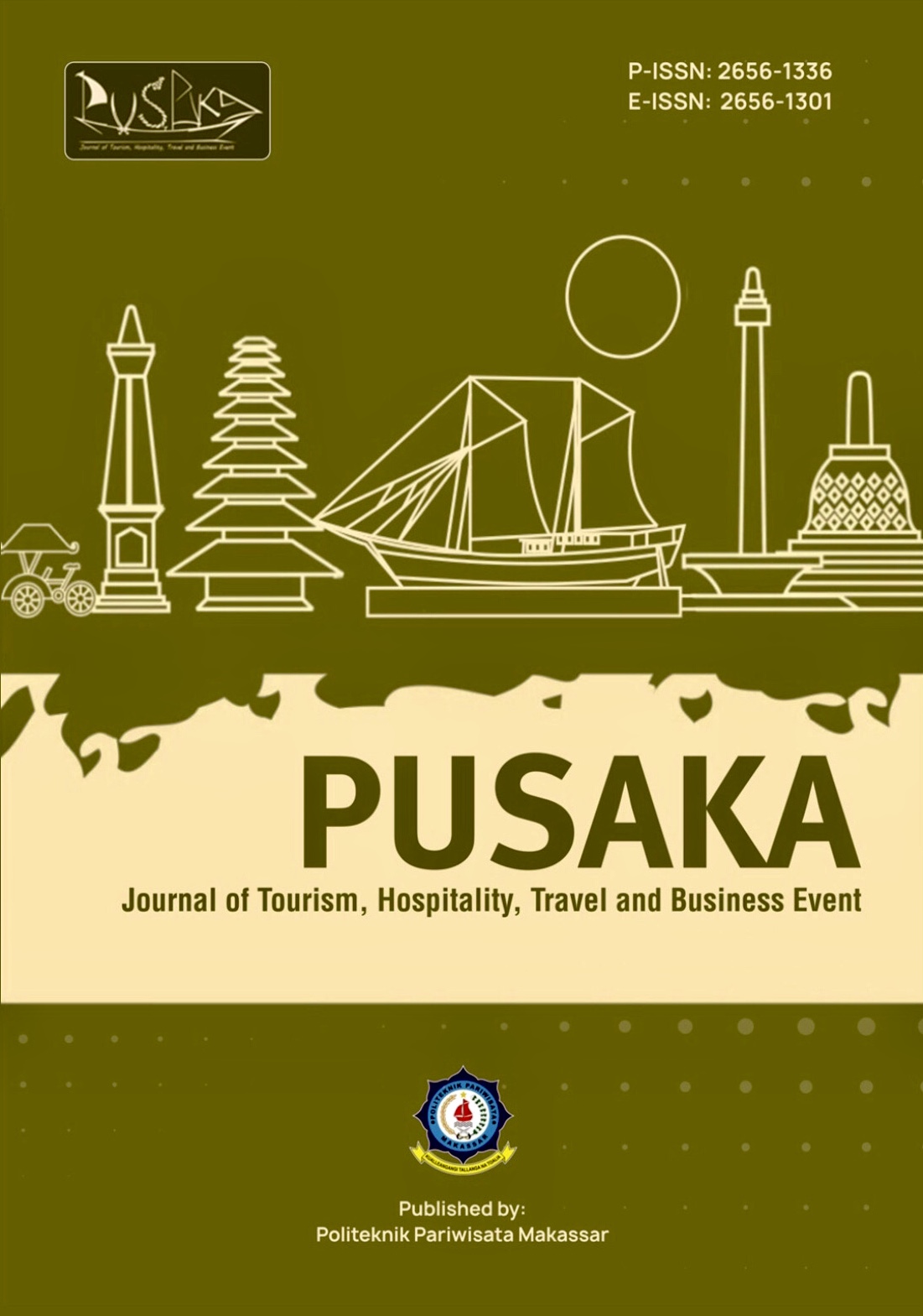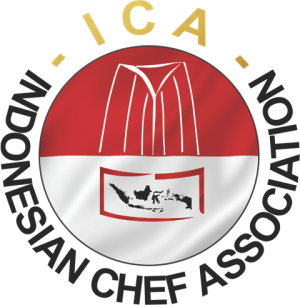Managing Glocalization: Exploring the Dynamics, Transformations, and Challenges of Food in South Sulawesi
DOI:
https://doi.org/10.33649/pusaka.v5i2.242Keywords:
Glocalization, Globalization, LocalAbstract
This study explores South Sulawesi's glocalisation. This study is conducted in Makassar City, Pare-Pare City, and Bulukumba Regency due to their higher urban and tourism context mobilisation, port accessibility, and port potential. This study investigates using phenomenology. Document analyses, observations, in-depth interviews, and focus group discussions (FGD) contribute to carefully selecting culinary or tourism industry experts as informants. According to the research, globalisation and localisation have affected South Sulawesi dishes' appearance, aroma, flavour, and environment (sight and touch). Since these are commercial dishes, fundamental ingredients and market values are essential. Since "traditional terminology" is devalued, contemporary cuisine is also gaining popularity. Modernisation and globalisation have altered the community's ontological security. Globalisation, technology, and transportation have altered every aspect of celebrations, including food. Due to the absence of a commercial context (anticipated monetary rewards), the festival is the only location where traditional culinary offerings are more likely to persist than elsewhere.
References
Appadurai, A. (1996). Modernity At Large: Cultural Dimensions Of Globalization (Vol. 1). In Public Worlds: University Of Minnesota Press.
Bauman, Z. (1998). Globalisation: The Human Consequences. Polity Press.
Bessière, J. (1998). Local Development And Heritage: Traditional Food And Cuisine As Tourist Attractions In Rural Areas. Sociologia Ruralis, 38(1), 21-34.
Birch, L. L., Mcphee, L., Shoba, B. C., Pirok, E., & Steinberg, L. (1987). What Kind Of Exposure Reduces Children’s Food Neophobia? Appetite, 9, 171–178.
Calhoun, C. (2002). Imagining Solidarity: Cosmopolitanism, Constitutional Patriotism And The Public Sphere. Public Culture, 14(1), 147-172.
Chang, R. C., & Mak, A. H. (2010). Food Preferences Of Chinese Tourists. Annals Of Tourism Research, 37(4), 989-1011
Cohen, E., & Avieli, N. (2004). Food In Tourism - Attraction And Impediment. Annals Of Tourism, 31(4), 755-778.
Cohen, E., & Avieli, N. (2004). Food In Tourism - Attraction And Impediment. Annals Of Tourism Research, 31(4), 755-788.
Fischler, C. (1988). Food, Self, And Identity. Social Science Information, 27(2), 275-292.
Fox, R. (2007). Reinventing The Gastronomic Identity Of Croation Tourist Destinations. International Journal Of Hospitality Management, 26(3), 546-559.
Giddens, A. (1996). Affluence, Poverty And The Idea Of A Post-Scarcity Society. Development And Change, 27(2), 365-377.
Hall, C. M., & Sharples, L. (2003). The Consumption Of Experience Or The Experience Of Consumption? An Introduction To The Tourism Of Taste. In Food Tourism Around The World. Academic Press Inc.
Hall, C. M., & Sharples, L. (2003). The Consumption Of Experiences Or The Experience Of Consumption? An Introduction To The Tourism Of Taste. In Food Tourism Around The World. Academic Press Inc.
Hasan, Lily Dianafitry, Muhammad Anas, and Muh. Zainuddin. 2021. “Foodie’s Point of View on Consuming Popular-Commercial Food.” Journal of Business and Management Studies 3(2): 213–17.
Kennedy, G., Nantel, G., & Shetty, P. (2004). Globalisation Of Food Systems In Developing Countries: Impact On Food Security And Nutrition. 83. In FAO Food And Nutrition Paper.
Kim, Y. G., Nantel, G., & Shetty, P. (2009). Building A Model Of Local Food Consumption On Trips And Holidays: A Grounded Theory Approach. International Journal Of Hospitality Management, 28(3), 423-431.
Lang, T. (1999). The Complexities Of Globalization: The UK As A Case Study Of Tension Within The Food System And The Challenge To Food Policy. Agriculture And Human Values, 16(2), 169-185.
Llosa, M. V. (2009). Foreignpolicy.Com. Retrieved April 3, 2023, From Https://Foreignpolicy.Com/2009/11/20/The-CultureOf-Liberty/
Mak, A. H., Lumbers, M., & Eves, A. (2012). Globalisation And Food Consumption In Tourism. Annals Of Tourism Research, 39(1), 171-196.
Medina, F. X., & Tresserras, J. (2018). Food, Gastronomy And Tourism Social And Cultural Perspectives (Colleccion). Universidas De Guadalajara.
Molz, J. G. (2007). Eating Difference: The Cosmopolitan Mobilities Of Culinary Tourism. Space And Culture, 10(11), 77-93.
Molz, J. G. (2007). Eating Difference: The Cosmopolitan Mobilities Of Culinary Tourism. Space And Culture, 10(1), 77-93.
Montanari, M. (2006). Food Is Culture. New York: Columbia University Press.
Nieswiadomy, R. M. (1993). Foundation Of Nursing Research. Norwalk. CT: Appleton & Lange.
Oostrever, P. (2006). Globalization And Sustainable Consumption Of Shrimp: Consumer And Governance In The Global Space Of Flows. International Journal Of Consumer Studies, 30(5), 465-467.
Porter, M. E. (1998). The Competitive Advantage Of Nations With A New Introduction. New York: The Free Press.
Porto, G. G. (2007). Globalisation And Poverty In Latin America: Some Channels And Some Evidence. World Economy, 30(9), 1430-1456.
Quan, S., & Wang, N. (2004). Towards A Structural Model Of The Tourist Experience: An Illustration From Food Experiences In Tourism. Tourism Management, 25(3), 297-305.
Quan, S., & Wang, N. (2004). Towards A Structural Model Of The Tourist Experience: An Illustration From Food Experiences In Tourism. Tourism Management, 25(3), 297-305.
Rahman, F. (2016). Jejak Rasa Nusantara: Sejarah Makanan Nusantara.
Reiser, D. (2003). Globalisation: An Old Phenomenon That Needs To Be Rediscovered Of Tourism. Tourism And Hospitality Research, 4(4), 306–320.
Richards, G. (2020, January). Gastronomy: An Essential Ingredient In Tourism Production And Consumption? Tourism And Gastronomy, pp. 17–34.
Rizkiyah, Putri et al. 2022. “Development Strategy of Local Snacks in Lombok Island as Culinary Tourism Products Using Swot Analysis.” 2022(1): 501–13. https://orcid.org/0000-0002-0662-619X.
Ritzer, G. (1983). The "Mcdonaldization" Of Society. The Journal Of American Culture, 6(1), 100–107.
Ritzer, G. (2003). Rethinking Globalization: Glocalization/Grobalization And Something/Nothing. Sociological Theory, 21(3), 193-209.
Robertson, R. (1995). Glocalization: Time-Space And Homogeneirt - Hetrogeneity. Sage Publication, pp. 25–44.
Robertson, R. (1995). Glocalization: Time-Space And Homogeneirt - Hetrogeneity. Sage Publications, pp. 25–44.
Robertson, R. (1998). Globalization: Social Theory And Global Culture. Sage Publication.
Savarin, B. (1984). Physiologie Du Gout Ou Meditations Gastronmie Transcendante Ouvrage Theorique, Historique, Et A L'orde Du Jour. Paris: Librairie Garnier Freses.
Syahrial, Syahrial, Faisal Akbar Zaenal, Syamsu Rijal, and Muh. Zainuddin Badollahi. 2020. “Model Development Based on GIS: Culinary Tourism in East Luwu Regency.” International Journal of Multicultural and Multireligious Understanding 7(2): 82.
Tefler, D. J., & Wall, G. (2000). Strengthening Backward Economic Linkages: Local Food Purchasing By Three Indonesian Hotels. Tourism Geographies, 2(4), 421–447.
Teo, P., & Li, L. H. (2003). Global And Local Interactions In Tourism. Annals Of Tourism Research, 30(2), 287–306.
Thorns, D. C. (1997). The Global Meets The Local: Tourism And The Representation Of The New Zealand City. Urban Affairs Review 1, 33(2), 189- 208.
Torres, R. (2002). Toward A Better Understanding Of Tourism And Agriculture Linkages In The Yucatan: Tourist Food Consumption And Preferences. Tourism Geographies, 4(3), 282–306.
Torres, R. (2002). Toward A Better Understanding Of Tourism And Agriculture Linkages In The Yucatan: Tourist Food Consumption And Preferences. Tourism Geographies, 4(3), 282–306.
Torres, R. (2003). Linkages Between Tourism And Agriculture In Mexico. Annal Of Tourism Research, 30(3), 282–306.
Torres, R., & Skillicorn, P. (2004). Montezuma's Revenge: How Sanitation Concerns May Injure Mexico's Tourist Industry. Cornell Hotel And Restaurant Administration Quarterly, 45(2), 132– 144.
Trubek, A. B. (2008). The Taste Of Place: A Cultural Journey Into Terroir. California Studies In Food And Culture, 318.
Tse, P., & Crotts, J. C. (2005). Antecedents Of Novelty Seeking: International Visitors Propensity To Experiment Across Hong Kong’s Culinary Traditions. Tourism Management, 26, 965–968.
Van Esterik, P. (2008). Food Culture In Southeast Asia. Westport: Greenwood Press.
Wihelmina, Q., Joost, J., George, E., & Guido, R. (2010). Globalization Vs. Localization: Global Food Challenges And Local Solutions. International Journal Of Consumer Studies, 34(3), 357–366.
Wu, D. D. (2008). Discourses Of Cultural China In The Globalizing Age. In D. D. Wu (Ed.), Discourses Of Cultural China In The Globalizing Age (P. 1). Hong Kong University Press.
Zaenal, F. A., Hasan, L. D., Alamsyah, M. A., Muzakkir, A., & Amalia, I. F. (2022). Studi Fenomena Foodie Di Kota Makassar. Makassar: CV. Global Aksara Pers.
Downloads
Published
How to Cite
Issue
Section
License

This work is licensed under a Creative Commons Attribution-ShareAlike 4.0 International License.






















